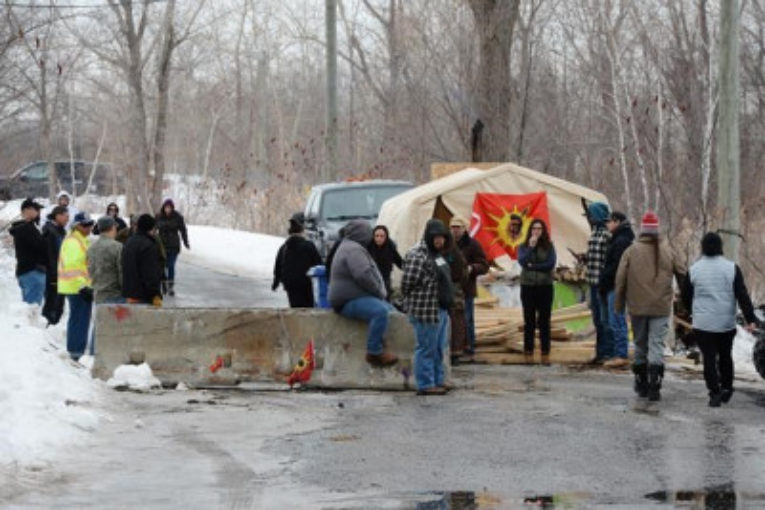
MONTREAL — Canadian Pacific Railway obtained an injunction Tuesday aimed at ending a blockade erected more than two weeks ago in a Mohawk community south of Montreal.
Coming a day after Kahnawake’s elected band council had praised the railway and the province for showing restraint, the move came angered protesters, who say they are supporting Wet’suwet’en hereditary chiefs.
“We were surprised to get an injunction from CP Rail, we had a good relationship with them … they indicated they were not going to be asking for an injunction,” said Kenneth Deer, the secretary of the Mohawk Nation at Kahnawake on Tuesday.
CP Rail said in a statement that despite obtaining the injunction to the blockade of its tracks in Kahnawake, it is encouraging peaceful dialogue to resolve the matter.
The railway said it needed to act after more than two weeks without a resolution and with “copycat” blockades popping up, including those by non-Indigenous Peoples.
“CP was compelled to take action to secure a province-wide injunction to deal with future ‘copycat’ blockades,” a spokesman for the railway wrote, noting the company’s CEO last week supported the Wet’suwet’en hereditary chiefs’ request for direct dialogue with the prime minister.
Quebec Superior Court Justice Michel A. Pinsonnault granted the order, which is valid until March 5 and authorizes any police force to assist CP to execute the order, including Kahnawake Mohawk Peacekeepers.
But in a statement late Tuesday, Kahnawake’s grand chief said the injunction will not be enforced. “It is truly unfortunate that CP is taking this rash course of action, which will only add to the problems at hand,” Joseph Norton said.
The band council’s statement declared that the local Peacekeepers are the only police force with jurisdiction over Kahnawake, implying there is no place for provincial police on the reserve. It quoted Peacekeeper Chief Dwayne Zacharie as saying his officers have “no interest in criminalizing people for standing up for our rights.”
Premier Francois Legault tread carefully as the injunction was being granted Tuesday, saying he’s confident Quebec provincial police would take the correct steps.
“Of course we have to be very, very careful. I remember Oka,” Legault said, referring to the 1990 crisis triggered by a provincial police intervention in the Mohawk community of Kanesatake. “But at the same time, we’ve been in this situation for 20 days now, people in Quebec are suffering and I think we need to dismantle those barricades.”
Legault said he wants everything to be done to ensure the blockades end peacefully.
Deer said that upon learning of the injunction, the people at the Kahnawake blockade said they plan to stay put.
“Their understanding is they are there to support the Wet’suwet’en chiefs, and the chiefs have not yet made an agreement with the Government of Canada, so therefore the blockade will still continue,” Deer said.
Quebec provincial police didn’t immediately comment.
The blockaded line is used for freight traffic as well as commuter rail service between Montreal and several communities to the south, which was interrupted as of Feb. 10.
Exo, the transit authority that operates commuter trains on the line, said it is losing $35,000 to $45,000 each weekday the Kahnawake blockade continues as it is forced to rent buses to shuttle passengers to and from downtown.
That means the blockade had cost the commuter rail agency up to $540,000 by Tuesday afternoon, the 12th weekday of rail disruption.
A second injunction was granted Tuesday in Quebec City to deal with a blockade along a small rail line in Listuguj, a Mi’kmaq community in eastern Quebec, about 525 kilometres northeast of Quebec City by the New Brunswick border.
Meanwhile, Sherbrooke police moved in to end another blockade set up Tuesday, about 150 kilometres east of Montreal.
Nineteen people, their faces covered with masks, blocked a rail line in the city’s Lennoxville district in support of Wet’suwet’en chiefs.
Police dismantled the blockade, arresting those on site in the afternoon one by one.
This report by The Canadian Press was first published Feb. 25, 2020.
— With files from Christopher Reynolds in Montreal.
Share This:
You can read more of the news on source



